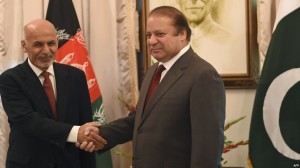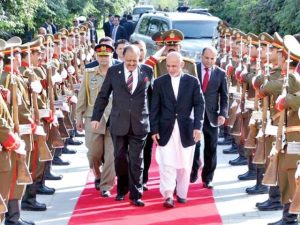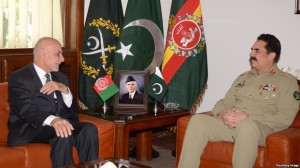Since the formation of new government in Afghanistan there has been a flurry of activity between Kabul and Islamabad.  In pursuit of Prime Minister Nawaz Sharif’s vision of peaceful neighbourhood, series of professional and technical level visits culminated in the summit. Prime Minister Nawaz in a joint presser with Afghanistan President Ashraf Ghani reaffirmed his vision of a strong and comprehensive partnership between Pakistan and Afghanistan. “Our two countries face formidable challenges including extremism and terrorism, a precarious security environment and transnational crimes,” said the PM. He outlined immense opportunities for the two countries and said that the two countries were yet to discover the vast potential of their bilateral co-operation.
In pursuit of Prime Minister Nawaz Sharif’s vision of peaceful neighbourhood, series of professional and technical level visits culminated in the summit. Prime Minister Nawaz in a joint presser with Afghanistan President Ashraf Ghani reaffirmed his vision of a strong and comprehensive partnership between Pakistan and Afghanistan. “Our two countries face formidable challenges including extremism and terrorism, a precarious security environment and transnational crimes,” said the PM. He outlined immense opportunities for the two countries and said that the two countries were yet to discover the vast potential of their bilateral co-operation.
President Ahsraf Ghani also articulated similar sentiment for the two countries. He sought Pakistan’s help in talks with the Taliban to avoid any instability in the post-Nato Afghanistan. In this context he also talked to Maulana Fazal-ur-Rehman who has abiding influence over Afghan Taliban. Other issues on the agenda included trade and economic cooperation, border security, connectivity, energy and people to people contacts.Pakistan is one of the first countries President Ghani has chosen to visit. Ghani’s visit to Pakistan was indeed a two-day fence-mending mission. It indicates how the relationship has transformed with the change in government in Kabul.
Islamabad-Kabul relations have historically been tense and complicated due to reignited border disputes, differences over counter-terrorism and countless exchanges of allegations. At the root of the tensions between the two countries are unfulfilled expectations on both sides. Bilateral interactions have never been short on tall talk and rhetoric. However, devil lies in details and implementation. While both Pakistan and Afghanistan realise the importance of peace, both have been consumed by the controversies on trivialities. What cannot be denied is the serious problem that both countries face in the form of militancy. President Ghani’s visit to Pakistan presented a rare opportunity to make a departure from a traditional zero sum approach.
Afghanistan’s all immediate neighbours are striving to contain negative spillover of militancy in to their areas, and are trying to capitalize on the opportunities arising out of emergence of new leadership in Kabul which is not burdened by a retarding historic baggage. In this context, China’s recent initiative for Afghan reconciliation is an important development. With a receding US footprint in the region, China’s offer presents a new starter for the moribund intra-Afghan peace process.
China has recently put forward a proposal for a “peace and reconciliation forum” that would gather representatives from Afghanistan, Pakistan, China and the Taliban. The Chinese plan, was discussed at a recent meeting of nations taking part in the “Istanbul Process” on Afghanistan’s future. China has proposed setting up of a forum to restart stalled peace talks between Afghanistan and Taliban. China’s proposal has not yet been formally announced because Afghan President wants more time to see whether the Taliban and Pakistan are willing to join in. “From the Chinese side it is a very positive attitude and they would invite the Taliban to China if Afghanistan agreed to it,” said an Afghan official who travelled with Ghani. “They are offering to take the role of facilitator.” Afghans want a more public show of support from Pakistan, and they are hopeful that it would happen. China may have a better chance of succeeding in restarting intra-Afghan peace process than the United States, because of its close ties with Pakistan.
During the meeting of two presidents, President Mamnoon Hussain said that the people of Pakistan wish the Afghan people all success in their endeavours to achieve peace and progress. He reaffirmed Pakistan’s desire to build a broad-based and forward-looking relationship with Afghanistan. He emphasized that along with security cooperation, mutual collaboration in the economic arena must also grow significantly. He underlined the importance of trans-regional energy projects like CASA-1000 and TAPI gas pipeline. President Ghani also reiterated the desire that the two countries should work closely to enhance mutual cooperation in all areas of common interest. He emphasized the importance of common endeavour for peace and stability, enhanced trade, economic ties, energy and connectivity, and regional cooperation.
He reaffirmed Pakistan’s desire to build a broad-based and forward-looking relationship with Afghanistan. He emphasized that along with security cooperation, mutual collaboration in the economic arena must also grow significantly. He underlined the importance of trans-regional energy projects like CASA-1000 and TAPI gas pipeline. President Ghani also reiterated the desire that the two countries should work closely to enhance mutual cooperation in all areas of common interest. He emphasized the importance of common endeavour for peace and stability, enhanced trade, economic ties, energy and connectivity, and regional cooperation.
Close cooperative relations with Afghanistan based on mutual respect and trust remains a high priority in Pakistan’s foreign policy. Pakistan fully supports a peaceful, stable and prosperous Afghanistan. Afghan President also sought to move his country away from a ‘relationship of suspicion’ with Pakistan and base it on mutual trust. “We have lived in an environment of suspicion which was an obstacle to transforming the region into a hub of economic prosperity,” Ghani said. “Mutual economic dependence is the key to prosperity… alone we can strive but together we can thrive,” he added.
Ghani offered a short to long-term framework for economic and commercial ties between both the countries. He also offered his country as a ‘land bridge’ between Pakistan and Central Asia and sought the same facility from Pakistan for trade with India. He vowed to increase bilateral trade to $5 billion by 2017 and offered a one-year regional cooperation plan besides seeking four-year targets for bilateral cooperation.
Pakistan has allowed Afghanistan’s transportation to move across its territory, said the Afghan president. He offered Pakistan to setup common supply chains. Pakistan has also agreed to lower tariffs and charges for ports and storage facilities to facilitate Afghanistan. Both the countries have agreed to remove all impediments to trade. Both countries have also agreed to alternate dispute resolution mechanisms. Pakistan has also offered to hold talks on the Bilateral Preferential Trade Agreement besides offering to train Afghan customs officials. These measures have amply demonstrated that both sides are showing great flexibility in resolving their outstanding issues. Afghan President joyfully remarked that trade related ‘obstacles of the last 13 years have been removed within three days’.
Another highlight of Ghani’s engagements on the first day of his trip was a visit to the GHQ in Rawalpindi, soon after landing in Islamabad – an unprecedented move since it is rare that a head of state begins his visit from military headquarters.  Ghani was accompanied by Afghan Defence Minister, Chief of General Staff General and senior Afghan security officials. The visiting delegation was given detailed briefing on security situation on the Pak-Afghan border. The Afghan president appreciated Pakistan’s efforts to fight terrorism and sacrifices rendered by the nation. He said Afghanistan wanted to bolster security and defence ties with Pakistan including cooperation in military training and border management. He also assured of Afghan cooperation to jointly curb the menace of terrorism. There was a visible change in the atmosphere as Afghan president avoided the blame game and talked of building a new cooperative relationship.
Ghani was accompanied by Afghan Defence Minister, Chief of General Staff General and senior Afghan security officials. The visiting delegation was given detailed briefing on security situation on the Pak-Afghan border. The Afghan president appreciated Pakistan’s efforts to fight terrorism and sacrifices rendered by the nation. He said Afghanistan wanted to bolster security and defence ties with Pakistan including cooperation in military training and border management. He also assured of Afghan cooperation to jointly curb the menace of terrorism. There was a visible change in the atmosphere as Afghan president avoided the blame game and talked of building a new cooperative relationship.
Unlike his predecessor, Ghani is seeking close and cooperative relations with Pakistan by reducing the trust deficit that tattered bilateral relations. Pakistan’s leadership has also made it clear to the new Afghan President that their country would not interfere in Afghanistan’s internal matters. Afghanistan’s new political administration after deep thought found it an appropriate time to mend fences with Pakistan for mutual interest, largely because of the departure of US-led international forces from their war-torn country. It is about time that Afghanistan and Pakistan enter into a new era of constructive relations for the interest of peace and economic development in the region. Peace in the region would remain elusive until Afghanistan and Pakistan join hands.
The Nation November 17, 2014 Disclaimer: Views expressed are of the writer and are not necessarily reflective of IPRI policy.
